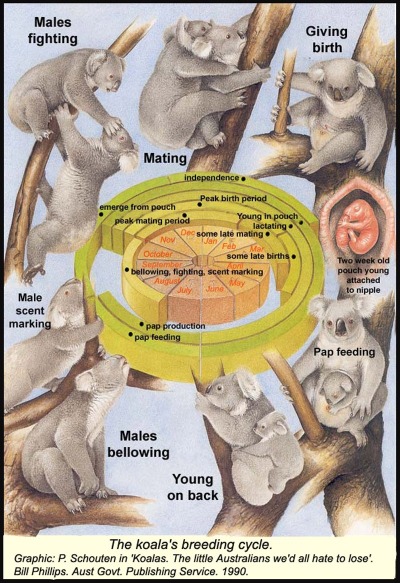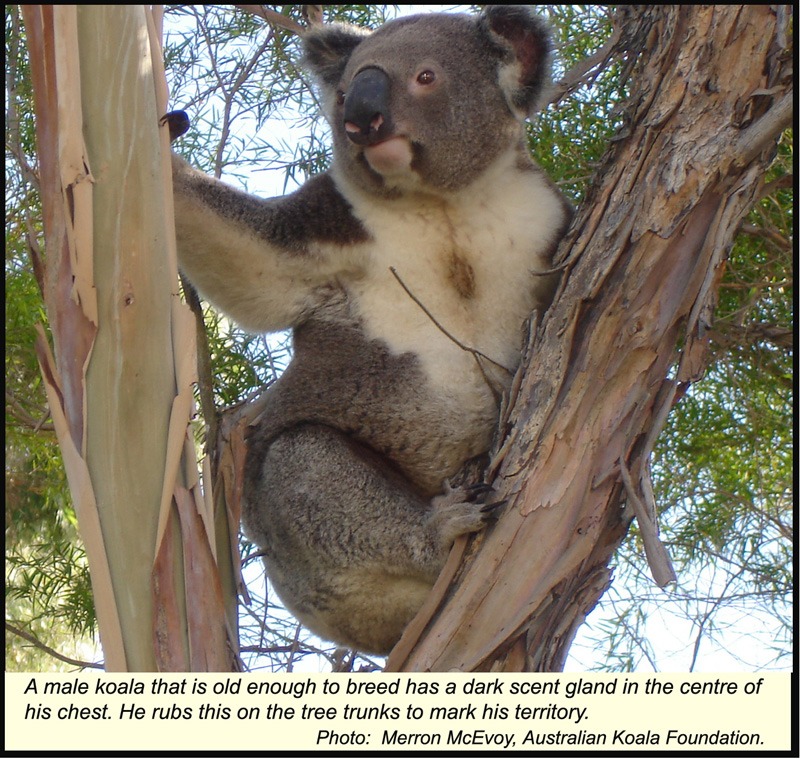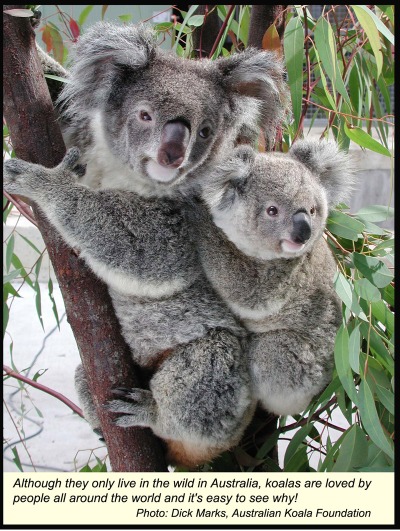 The
life cycle of the koala is not unusual, by any means. There
are some unique aspects, though. In the fall, males begin to
bellow to attract a mate. Males will use their dark scent
glands, located in the middle of their chests, to mark their scent
onto a tree. The
life cycle of the koala is not unusual, by any means. There
are some unique aspects, though. In the fall, males begin to
bellow to attract a mate. Males will use their dark scent
glands, located in the middle of their chests, to mark their scent
onto a tree.
 This
serves to tell other koalas that that tree is occupied. It
also warns subordinate males that there is a dominant male in the
area. Males will fight for a mate. The alpha male
usually mates with several females within its home range, and even
prevents other males from mating. A lot is still unknown about
the mating cycle of koalas. Scientists who have observed
koalas have yet to determine if there are any special courtship
rituals
between the males and females. This
serves to tell other koalas that that tree is occupied. It
also warns subordinate males that there is a dominant male in the
area. Males will fight for a mate. The alpha male
usually mates with several females within its home range, and even
prevents other males from mating. A lot is still unknown about
the mating cycle of koalas. Scientists who have observed
koalas have yet to determine if there are any special courtship
rituals
between the males and females.
Gestational length of the koala is 34 to 36 days. It has
been observed in captivity, however, that the gestational length is
at least 50 days (Gifford et al.). This distinction is
important for researchers to understand because it can dictate
management methods. More research still needs to be done to
determine the large difference in gestational length between wild
and captive animals.
The
mother will then give birth. After birth, the young joey will
immediately climb into its mother's pouch and firmly attach itself to
one of its mother's teats. The young stays attached to its
mother's teat for the entire time spent in the pouch. At this
point it can be referred to as a "pouch young." The
young koala is hairless and bears little resemblance to the adult
koala. After about thirteen weeks, the koala will start to
resemble the adult. At about 22 weeks the joey will peek its
head out of the pouch. Once out of the pouch the joey will start feeding on pap, which
is a runny derivative of the mother's feces. Upon first
emerging from the pouch, the joey will attach to its mother's belly
until it is old enough to climb onto its mother's back. After birth, the young joey will
immediately climb into its mother's pouch and firmly attach itself to
one of its mother's teats. The young stays attached to its
mother's teat for the entire time spent in the pouch. At this
point it can be referred to as a "pouch young." The
young koala is hairless and bears little resemblance to the adult
koala. After about thirteen weeks, the koala will start to
resemble the adult. At about 22 weeks the joey will peek its
head out of the pouch. Once out of the pouch the joey will start feeding on pap, which
is a runny derivative of the mother's feces. Upon first
emerging from the pouch, the joey will attach to its mother's belly
until it is old enough to climb onto its mother's back. The now named "back young" will stay with its mother until it is
about a year old. By this time, the mother usually gives birth
to a new cub, forcing the year old joey to leave. The young
koala will stay in the same tree as its mother, but will feed on its
own and no longer be allowed on its mother's back. In the next
year or so the koala will leave its mother and find its own home
range.
The now named "back young" will stay with its mother until it is
about a year old. By this time, the mother usually gives birth
to a new cub, forcing the year old joey to leave. The young
koala will stay in the same tree as its mother, but will feed on its
own and no longer be allowed on its mother's back. In the next
year or so the koala will leave its mother and find its own home
range.
Females usually give birth to their first young at around 18
months of age. The young rarely survive when the mothers are
this young. The first successful pregnancy occurs around 2
years of age. Males can start to reproduce at 2 years of age,
but are usually prevented from doing so by the older male koalas.
The 2 year old male will be much smaller in size than the dominant
male, so it is easy for the dominant male to prevent the young males
from reproducing.
|